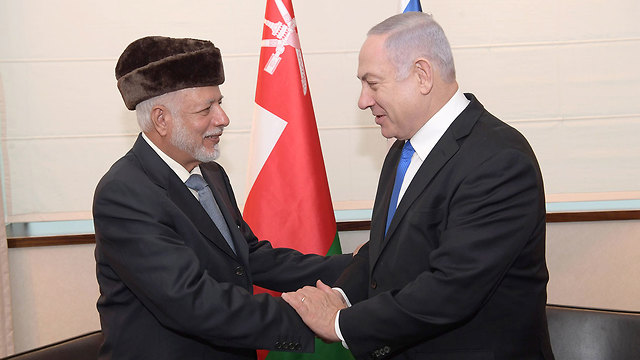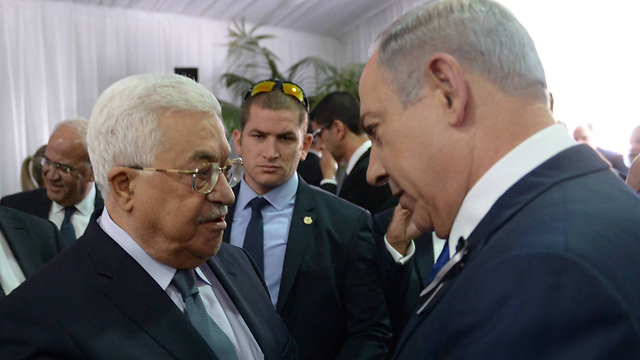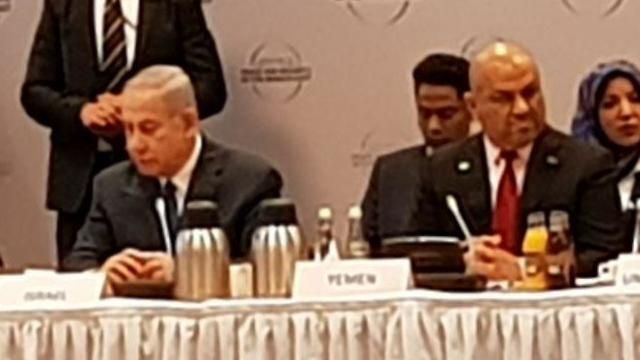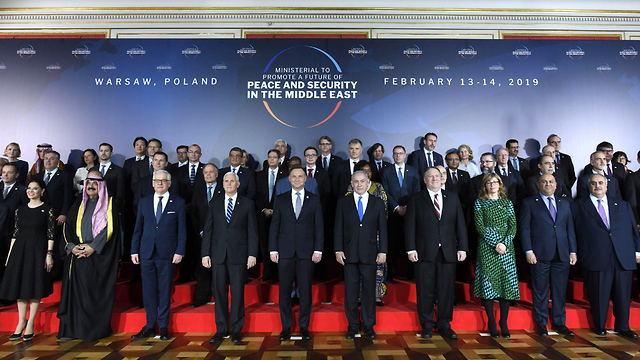
Warsaw detente gives way to Israeli-Arab divergence on Palestinians
Analysis: The recent Mideast conference in Poland may have given Israel hope for future warm relations across the region, but Egypt and Saudi Arabia - and their people - are adamant that the peace process must come first.
US President Donald Trump has yet to release his long-awaited Israeli-Palestinian peace plan, yet Arab states have already indicated their displeasure with what they believe the plan will entail.
During last week’s American-led conference in Warsaw on peace and security in the Middle East, which was primarily intended to rally support for further isolating Iran, the Israeli-Palestinian peace plan often took center stage. In a recording of remarks he made during the event—which was aired on Israeli television— Prime Minister Binyamin Netanyahu cautioned Arab states not to reject the Trump administration’s plan before its official unveiling.
“I don’t think any of us should reject the plan by the American administration before it is even presented,” Netanyahu reportedly told participants.
However, the premier sounded a skeptical note of his own, adding: “For Israel to be at peace or normalize relations with the broader Arab world, we must have Israel and Palestinian peace,” he said. “Since peace was not forthcoming, we were stuck with no options.”
But things are changing, he continued. “Of course, it is true, if we make progress and have formal peace with Palestinians, it will help us with the Arab world… When we meet with Arab leaders and we talk about organizing the ability to move in the Middle East, to fly over countries in the Middle East, to have economic relations—that actually contributes to the achievement of a broad peace and an Israeli-Palestinian peace.”
While Jerusalem has been making great gains in establishing economic, military and diplomatic ties with regional states, Arab leaders issued comments at the conference suggesting they favor the first approach, namely, first and foremost, forging peace with the Palestinians.
The sharpest words came from Egyptian President Abdel al-Fatah al-Sisi, who said “the failure to reach a fair and final settlement of the Palestinian issue represents the main source of instability in the Middle East.” He reiterated his support for the two-state solution along the 1967 borders, with East Jerusalem as the capital of a future Palestinian state.

Saudi Arabia’s Foreign Minister Adel al-Jubeir also emphasized the commonly held belief in his country that solving the Israeli-Palestinian conflict would then “turn down emotions and set the stage for stronger cooperation for countries in the region.”
Dr. Yossi Mekelberg, a professor of International Relations at Regent’s University in London, told The Media Line that “the reason Netanyahu wants a peace process is because he learned that such a process can go on forever.”
The premier, he said, “is not interested in end products. Instead, he’s interested in a process with which the region would be satisfied enough—a process that seems to be doing something to support the Palestinians.
“Prime Minister Netanyahu is not doing anything to support a favorable outcome for Palestinians,” Mekelberg said, expressign the belief that Netanyahu has not led a government that is interested in supporting a genuine two-state solution. He accused Netanyahu of seeking the collapse of the Palestinian Authority by supporting cuts to Palestinian aid entities, as well as the US Anti-Terrorism Clarification Act (ATCA), which could bring multimillion-dollar lawsuits against the PA.

Furthermore, the prime minister has been focused on confronting Iran, suggesting the need for “consultation” with Arab states which could imply military options, he added. The idea of leading those seeking to confront Iran is his main strategy for securing another mandate in the upcoming Israeli elections.
Mekelberg concludes that there is no “sense of urgency” for him to make any real progress on the Palestinian issue.
Shehab al-Makahleh, CEO of Geostrategic Media and a Middle East political analyst based in Jordan, told The Media Line that while Netanyahu has been playing up Israel’s unprecedented deepening of relations with Arab-Gulf governments, which have also been constructively reaching out to find possible points of convergence, the people in these states generally reject the normalization of ties with Israel.

“What have Israelis done to deserve peace and the normalization of ties? What happened to the Palestinian cause and to Jerusalem? They ask. All of this leads to their full rejection of the shifting focus away from the Palestinian question to other marginal issues of less importance to them,” al-Makahleh said.
In response to the Warsaw conference, some Arab activists and media anchors have launched an online campaign against any bids to normalize ties with Israel, especially after the leaked meetings between some Arab foreign ministers and the Israeli premier, he explained.
“The recent visits of Israeli officials to Gulf states with which Israel does not maintain official diplomatic ties—such as the UAE and Oman—should not be considered a breakthrough as these countries are distant from Israel’s borders,” he added. “Aside from Jordan and Egypt, progress with Lebanon, Syria, Iraq and Saudi Arabia is more important.
“Arabs at present criminalize normalization with Israel though some Arab countries maintain diplomatic ties with Tel Aviv,” al-Makahleh said. “Such campaigns to criminalize are based on fears that the Palestinian cause will be solved at the expense of Arab states. This would put the burden on these countries to absorb many Palestinians, depriving the latter of their national identity.”
Article written by Terrance J. Mintner. Reprinted with permission from The Media Line











